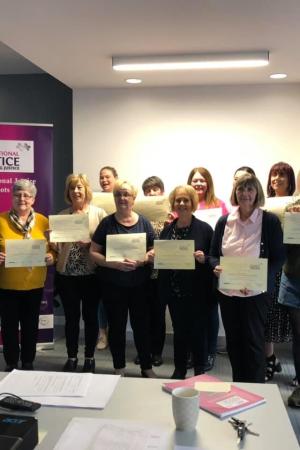Patricia O'Neill, Communications Manager, CRC
It was good to meet with a group of women at Shankill Women’s Centre today (21 February 2019). The group represented women from across Belfast, a good mix of thoughts and opinions. Some have taken part in many projects and courses from the Poppy and the Lily, to Irish History, Transitional Justice Toolkit Grassroots Programme and Epilogues and some are just starting on their journey. One woman joined the Centre for the ‘Aqua Fit’, then found out about an Irish History course and became interested. The women agree it has made their lives and the lives of their families better. Not too long ago some of the women would not have ventured to the Shankill Road and others would have avoided the Falls, now they feel safe and can pass that experience on to their children and partners. Eileen Weir who facilitates good relations programmes across Belfast is an ardent supporter of challenging perceptions and encourages good debate among and between participants. Her post is funded through CRC’s Core Funding scheme.
Here are a few comments from the women about their experiences:
People are so politically correct but in my experience ‘epilogues’ an open and honest thing to take part in. The facilitator challenges you.
I’d love to do it again, because of what I’ve learned since then.
It was an eye-opener, fantastic.
Everybody has a journey, what I learn in here and teach my kids, my daughter is 14 and doing cross-community stuff.
We’re over from Ballymurphy, we would have been scared to come to the Shankill, now I feel safe to come here.
Shankill & Falls Women's Centres have completed the first of two ‘epilogues’ weekends, the topics covered were violence, loss, and revenge.
‘Epilogues’ is an accessible workshop based education programme using a DVD and website to engage people in the everyday work of peace-building and responsible citizenship. It does this by exploring, within a workshop environment that models democratic process, six key themes that are central to an understanding of violent political conflict - Violence, Loss, Revenge, Forgiveness, Justice, & Human Rights. The exploration is deepened through direct engagement with the perspectives of both victims of, and the various parties to, the violent political conflict in and about ‘Northern Ireland’.
On their website ‘epilogues’ describe their workshops:
How significant are justice and human rights for democracy? What are the moral dilemmas facing a community in the aftermath of an act of extreme political violence? How should communities deal with the loss they have experienced? What are the factors that push people in such communities to support the taking of life? Can the use of violence for political ends ever be justified? What part does revenge play when political conflict becomes violent? What is the state’s responsibility in preventing or breaking the cycle of violence? Is forgiveness necessary for reconciliation and enabling people to move on? How significant are justice and human rights to the building of a sustainable peace? And at a deeper level still, what does violent political conflict reveal about the nature of ‘peace’, ‘democracy’, ‘history’, ‘identity’ and our perception of ‘right’ and ‘wrong’?
Within inclusive workshops that respect all perspectives but equally permit all perspectives to be challenged, ‘epilogues’ facilitates discussion and reflection on these and other key questions for peace building. It does this by exploring ‘the conflict’ from the perspective of people who were part of it, or suffered as a result of it, and found themselves compelled to react to circumstances unfolding around them with what perspective they had at the time.
Epilogues workbook received support from CRC’s Publication Scheme.

The women receiving their certificates from their Transitional Justice course.